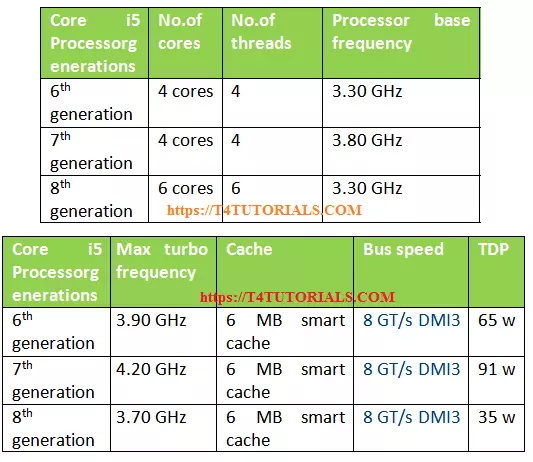What is the Difference between Core I5 6th 7th and 8th generations
There are many kinds of the processor which are being made by Intel company, these processors names are as intel core processor, Intel Pentium processor, Intel Celeron processor, Intel Xeon processor, Intel Xeon Phi processor, Intel Itanium processor, intel atom processor, and Intel Quark Soc. These all processors are used in a different electronic device like laptop, desktop, mobile phones, research devices, etc. however, There is a lot of difference between 6th, 7th and 8th generation’s processor of core i5 mostly the difference can observe in its performance, specifications and in features as well.

However there is also a difference in same core and same generation processors due to late launched with updated version as if we just talk about core i5’s 6th generation its # of cores, max turbo frequency, processor base frequency, and cache storage memory may vary from its every newly launched version in which all launched versions are being known as core i5 6th generation but the same generation may have different specification due to variations in launching dates.
Here is the comparison between 6th generation Intel Core i5 processor, 7th generation Intel Core i5 processor and 8th generation Intel Core i5 processor. If we talk about essentials of these three processors the vertical segment, processor number, lithography and status will be desktop for all, i5-6600, i5-7600K, i5-8600T, and 14 nm and launched will be for all respectively.
Performance of Core I5
If we talk about the performance of these processors then definitely there will be a big difference will be seen, as we know that the new version or new generation is being launched just because of improving the performance of the processor as ultimately the device performance. However, here I will discuss a few things regarding performance comparison. These are the performance differences between 6th, 7th and 8th generation of Core i5 processor.
Memory
In the memory specifications, the discussion about differences in memory will be seen in Max memory size, memory types, Max number of memory channel and Max memory bandwidth. So if we compare the Max memory size of upper three generations the memory size will be 64 GB for the 6th generation, 64 GB for the 7th generation and 128 GB for the 8th generation processors.
There every processor can support different type of memory type however the above processors have and can support the different memory type as 6th generation processor will support DDR4-1866/2133, DDR3L-1333/1600 @ 1.35V type of memory and 7th generation will support DDR4-2133/2400, DDR3L-1333/1600 @ 1.35V type of memory and 8th generation will support the DDR4-2666 type of memory. The max number of memory channels will be 2 for al above-mentioned generation of core i5 and max memory bandwidth for a 6th generation will be 34.2 GB/s and for an 8th generation, it will be 42.6 GB/s and there is no one processor which is ECC memory supported.
Processor’s Graphics of Core I5
In the 6th generation, the processor graphics is Intel HD graphics 530, in a 7th generation it rises as Intel HD graphics 630 and in an 8th generation, the HD is be replaced by UHD as Intel UHD graphics 630 due to UHD the graphics support will boost up. The graphics base frequency is 350 MHz for all the above three generations.
The graphics max dynamic frequency is also the same for all three generations as 1.15 GHz, the graphic video max memory is 64 GB for above three and these all are 4k supported. Max resolution for all three above generation is same as 4096*2304@60Hz.
The durability of Core I5
The thermal solution specification for all the above three generations is PCG 2015C (65 W) for 6th and 7th generations and PCG 2015A (35 W) for 8th generation processor. T Junction is 100 °C For 7th and 8th generations and the 6th generation can support T case at 70 °C.
Hence these are few differences in core i5’s 6th, 7th, and 8th generations processors.